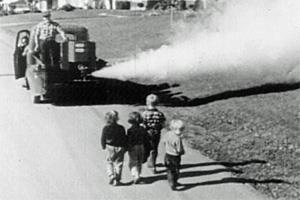The environmental movement could use a little encouragement right about now.
American Experience: Rachel Carson (Tues. 8 p.m. ET on PBS, check local listings), a splendid film that documents the life of the woman credited with inspiring the modern environmental movement, might just be the tonic.
Baby boomers, whose recollections of “duck and cover” school drills draw expressions of sheer disbelief on the faces of their grandchildren, undoubtedly will recall just where they were when they read Carson’s seminal work, Silent Spring. Others might remember huddling around the TV to watch CBS Reports: Rachel Carson’s Silent Spring.
All generations should watch this one on PBS Tuesday. It’s a comprehensive look not only at Carson, but her upbringing and the seeds sown that sprouted into her lifelong love of nature. Carson is portrayed as a quiet warrior, notably during the period she wrote Silent Sping and was descending into failing health. The book became “a race to finish,” her adopted son said. Even Carson, upon finishing Silent Spring in 1962 wrote to a dear friend that it was “like reaching the last station before the summit of Everest.”
Though it’s now widely accepted that there is a connection between what humans do to the environment and how that has an impact, the anti-regulation fervor stoked during the presidential election echoes viewpoints of the mid-20th century when science was all-powerful and could do no harm. And perhaps the most fascinating way the documentary characterizes that view is to filter it through the monumental achievements of World War II – subduing typhus in Italy and eradicating malaria among troops in the Pacific.

The chemical DDT, more than anything else, was used extensively by the military and later by agriculture before settling into consumer use that, by the late 1950s, saw more than 6,000 different synthetic pesticides available for household purchase. Even those who hold the most hardened positions against regulations that ultimately banned DDT should be stunned by documentary footage of children being sprayed while eating their school lunches, splashing in a swimming pool or enjoying their neighborhood while a truck lumbers through, spraying for mosquitoes.
The documentary thoughtfully retraces Carson’s life to show clearly the influences and circumstances that shaped her talent and her outlook. It’s a deliberately paced film that has a few wrinkles that will go unreported here. It’s also a straightforward film that portrays Carson honestly, notably including her acknowledging that pesticides no doubt have some benefits.
But the author is shown as brilliant, strong and determined, certainly equal to the task of countering the word war heaped on her by the chemical industry. The film is a sober reminder of what thoughtful, honest inquiry can do to counter irrational bombast. All can reflect on Carson’s reminder that humans are not separate from this living world.